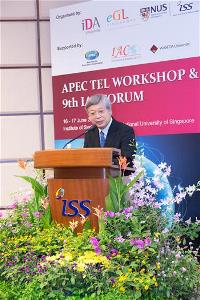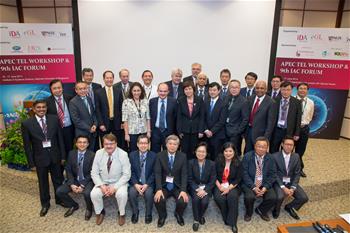Organised by IDA and eGL, the APEC TEL Workshop and 9th IAC Forum held in Singapore, calls for international cooperation to accelerate innovation and digital inclusion. This will help the ageing and special needs sector, as well as using technology for a smart city and improving lives of the people.
The APEC TEL Workshop & 9th IAC Forum 2014, which took place on 16 & 17 June 2014 in the NUS' Institute of Systems Science at Singapore, gathered over 36 expert speakers and 150 government officials, academia, non-governmental organisations (NGO), voluntary welfare organisations (VWO) and industry players from 24 economies like Japan, Thailand, South Korea, Russia, Malaysia, Taiwan, Hong Kong and so on. The objective was to discuss innovative solutions for an ageing society in the new era of ICT-enabled growth and innovation in e-Government.
Jointly organised by the Infocomm Development Authority of Singapore (IDA), Singapore e-Government Leadership Centre (eGL) and Institute of Systems Science, National University of Singapore (NUS-ISS), the event delved into ways to make ICT more accessible to the aged and people with special needs in order to enable them to participate in the digital economy. The event was supported by International Academy of CIO (IAC), Asia-Pacific Economic Corporation, Telecommunication Division (APEC TEL) and Waseda University.

Professor Toshio Obi speaking at the event
“By making ICT more accessible to a greater number of people, including the elderly and people with disabilities, and enhancing public and private data use, we can do a lot to create paperless environments and to reduce operating costs for businesses and economies,” said Professor Toshio Obi, Director of the APEC e-Government Research Centre at Waseda University, at the event.
The keynote presentations and discussion in the morning focused on ICT in the Ageing Society, with thought leaders and experts from Japan, Italy and Singapore examining various facets of the subject. There were four tracks in the afternoon with a variety of topics from Smart Cities to Open Data to CIO Training Model and International Cooperation. The final presentation and discussion was on building a culture of innovation for public service delivery. The speakers and delegates were then treated to a networking session held at NUS Kent Ridge Guide House.
“Governments today face higher expectations from citizens who use their best online transaction experiences from around the world, including that with the private sector as a yardstick for the quality of government digital services. Hence, it is no longer sufficient for
Government to just provide and upkeep services online, but to innovate, and keep on innovating to raise the bar of public service and to enhance the service experience of citizens when they interact with the government.” said Mr Amos Tan, Director, Strategy and Innovation Division (SID), IDA.
Consensus drawn at the workshop included the need for international cooperation and broad-based steps to be developed now, in particular the acceleration of innovation, design of secure and resilient environments, building strategic ICT capabilities, aligning policies with user-driven needs, promoting scalable solutions, harnessing data analytics for citizen participation, recognising the need for increased cross-cutting research and raising social awareness about ageing and disabilities.
In addressing the solutions needed to resolve the challenge, Mr Lim Swee Cheang, Director of NUS-ISS, said, “Learning from international best practices and the implementation of comprehensive strategies is a good start to address the needs of the elderly and people with disabilities in Singapore. We will continue to promote research and innovation of services in sectors such as healthcare, finance, training, transportation, community development, housing and e-government so as to provide an environment for the ageing and disabled folks with capabilities, opportunities, responsibilities and resources to maintain active participation and social inclusion. In addition, we advocate the use of design thinking to achieve good design to enable products, services or ICT for the elderly and people with disabilities.”
Apart from the need to enable ICT access for the elderly and people with disabilities, another pressing issue facing the region is the shortage of professional ICT manpower.
“Many programmes and services today are driven by technology. Without the right ICT competency skills and without enough people wanting to build a career in ICT, we will not be able to harness the ICT power to build a global-scale and national-scale integrated systems and deliver better online services,” shared Dr Christopher Chia, Chairman of NUS-ISS Management Board.

Our speakers gathering for a group photo
The workshop concluded that economies must drive user-centric, problem-driven innovation, balancing technology application & human touch for fast and effective deployment of ICT to support an ageing society and the PWDs sector. This includes continuing to promote cross-border collaboration to share knowledge and experience for a smarter and digitally inclusive government. The economies must continue to build new capabilities and leverage on 3P (public-private-people) partnership to improve our people’s quality of life.
The event was well-received by the participants
who came from around the region. “The topics
showcased were relevant and the speakers had great knowledge on the subject matters. The organisers of the conference get an ‘A’ from me,” said Associate Professor Madeline Suva from The College of Development Communication of the University of the Philippines Los Banos.
Dr Professor Sureswaran Ramadass from Malaysia shared the same sentiments when he thanked the organisers for “a great conference”.
For more reports on the APEC TEL, please refer to these press releases and reports:
• APEC TEL Workshop Calls for International Cooperation to Accelerate Innovation and Digital Inclusion to Help the Ageing and Special Needs Sector
• APEC turning to ICT to support aging populations
• APEC TEL Workshop & 9th IAC Forum